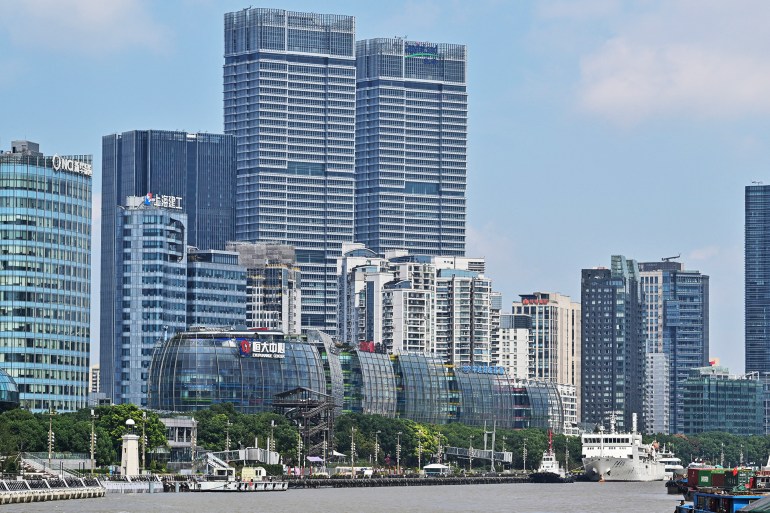China was one of the main drivers of the commodity super-cycle between 2000 and 2014, but slowing economic growth and the emergence of a huge debt bubble pose a huge risk to oil markets for the time being.
In a report published by the American "oil price" website, author Simon Watkins said that China has had a significant impact on oil prices for a long time, given the great disparity between its huge oil and gas needs and the minimum domestic energy reserves.
As a result of this disparity, China almost single-handedly created the commodity "supercycle" between 2000 and 2014, characterized by ever-increasing price trends for all goods used in a burgeoning manufacturing and infrastructure environment.
This cycle was largely caused by the annual growth of China's GDP by 8% during that period, in addition to the growth recorded by many other indicators at rates exceeding 10%, in contrast to a relative decline in economic growth at the beginning of the great financial crisis.
Aside from the huge quantities of imported oil and gas, this economic growth was driven by a large amount of accumulated debt that China thought it could eventually pay off simply through its rapid economic growth, and developments during the past period indicate that these bubbles may burst. , which will greatly affect the oil market.
In a statement to "Oil Price", Eugenia Fabone Victorino, Head of Asia Strategy at SEB Group (SEB) in Singapore, said that the energy market has witnessed some recovery, but the risks remain, and we still expect the growth to decline. GDP to 5.2% in 2022 compared to 8.2% recorded in 2021.
She added that easing financial conditions will not spare the real estate sector more trouble, and defaulting on bonds is a test of investors' willingness to risk, and the country's manufacturing purchasing managers' index rose suddenly in November, exceeding all expectations to reach the level of 50.1, while the managers' index recorded Non-manufacturing purchases for November are at 52.3, but official figures from China regarding its economy should be called into question.
Victorino explained that the uncertainty about the Omicron mutant is likely to reinforce the authorities' determination to adhere to a zero-tolerance policy towards "Covid-19", even if it remains a disincentive to private spending.
It sees investment continuing to decline, and although fiscal policy has become marginally supportive, with Beijing urging local governments to expedite advanced projects, the impact on infrastructure activity will not become apparent until the first quarter of 2022.
The refinancing needs of the real estate sector in the foreign market will rise next year by about 10 billion US dollars (French)
debt bubble
Alongside the macroeconomic uncertainty, there are growing fears that the long-fermenting Chinese debt bubble will finally burst, and the bubble was first highlighted by former Fitch analyst Charlene Chu.
China has long been covering up huge debts accumulated by many state-linked companies with a range of hard-to-scrutiny schemes, particularly wealth management products.
Combined with the natural bubbles in China's housing and other asset markets that have inflated over the past few years, the situation in China now is very similar to what it was like for banks in the West in 2007/08 that no one noticed until bankruptcies began, which have since turned That leads to a major financial crisis.
Although the Chinese debt-to-GDP ratio is officially less than 70%, it is in fact much higher. According to data from the People's Bank of China, "total social financing" reached CNY 284.83 trillion ($44.1 trillion) at the end of the month. December 2020, an increase of 13.3% compared to the previous year.
Even when the Chinese economy was growing at an average rate of 8% or more annually, the country could not get rid of its burden of debt, and with GDP expected to drop to about 5% or less next year, concerns increased about China's accumulated debt After the recent news regarding debt-related problems in the "Evergrand" group.
The expansion of the Evergrande Group's business led to the accumulation of debts, and until the Evergrande Group financed expansions in real estate and wealth management, the production of electric cars, and the manufacture of food and beverages, the company borrowed more than 300 billion dollars, and it is not surprising that it is struggling Now to pay off her debts and burdens.
Victorino explained that although fears of the crisis spreading outside the real estate sector have eased, risk appetite for investing in China's offshore bond markets remains weak.
She stated that the real estate sector represents only 2.2% of the maturities of bonds contained in the internal market in 2022, while the share of the maturities of real estate bonds in the external bond market is much higher by about 18%.
Victorino confirmed that the refinancing needs of the real estate sector in the foreign market will rise next year by about 10 billion dollars, to reach 57 billion, and the total maturities abroad are expected to reach its peak in March and April.

